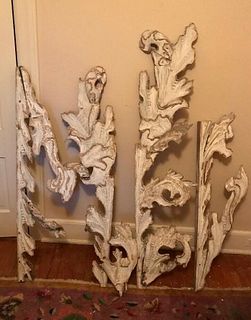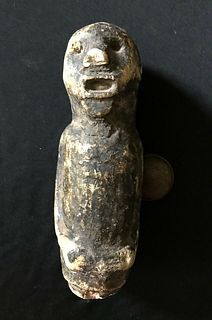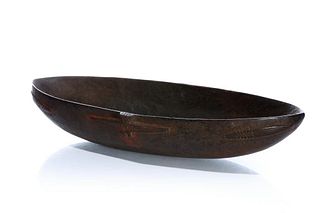Sioux Quilled Buffalo Bladder Bag & 2 Turtle Fetishes
Lot 81b
About Seller
Artemis Fine Arts
686 S Taylor Ave, Ste 106
Louisville, CO 80027
United States
Selling antiquities, ancient and ethnographic art online since 1993, Artemis Gallery specializes in Classical Antiquities (Egyptian, Greek, Roman, Near Eastern), Asian, Pre-Columbian, African / Tribal / Oceanographic art. Our extensive inventory includes pottery, stone, metal, wood, glass and textil...Read more
Categories
Estimate:
$800 - $1,200
Absentee vs Live bid
Two ways to bid:
- Leave a max absentee bid and the platform will bid on your behalf up to your maximum bid during the live auction.
- Bid live during the auction and your bids will be submitted real-time to the auctioneer.
Bid Increments
| Price | Bid Increment |
|---|---|
| $0 | $25 |
| $300 | $50 |
| $1,000 | $100 |
| $2,000 | $250 |
| $5,000 | $500 |
| $10,000 | $1,000 |
| $20,000 | $2,500 |
| $50,000 | $5,000 |
| $100,000 | $10,000 |
| $200,000 | $20,000 |
About Auction
By Artemis Fine Arts
Aug 22, 2025
Set Reminder
2025-08-22 10:00:00
2025-08-22 10:00:00
America/New_York
Bidsquare
Bidsquare : Indigenous Art - Ralph T. Coe Center, Santa Fe, NM
https://www.bidsquare.com/auctions/artemis-gallery/indigenous-art---ralph-t-coe-center-santa-fe-nm-20324
Featuring works of art from the Ralph T. Coe Center for the Arts in Santa Fe, New Mexico, a non-profit focused on promoting Indigenous Arts globally. All proceeds from the sale of these items will support future grants to Rehoming Program participants. Artemis Fine Arts info@artemisfinearts.com
Featuring works of art from the Ralph T. Coe Center for the Arts in Santa Fe, New Mexico, a non-profit focused on promoting Indigenous Arts globally. All proceeds from the sale of these items will support future grants to Rehoming Program participants. Artemis Fine Arts info@artemisfinearts.com
- Lot Description
Native American, Great Plains, Sioux People, ca. 20th century CE. A finely crafted group of three Sioux quillwork items, including a woman's buffalo bladder work pocket and two turtle-form umbilical cord fetishes, each made with exceptional care and symbolic meaning. The work pocket, cut from translucent buffalo bladder, features ends faced in supple buckskin, each decorated with bold bands of dyed porcupine quillwork. Its opening is edged with red leather fringe, while the interior retains dyed quills and string, evidence of its use and traditional preparation. Such bags served practical purposes for holding sewing or beading supplies, yet were also works of art in their own right, demonstrating the maker's skill in quill embroidery. The two turtle umbilical cord fetishes, one possibly containing the dried cord and the other stuffed with soft buffalo or horsehair, are formed from brain-tanned hide with hide thongs for the limbs. Size of largest (bag): 12.1" L x 3" W (30.7 cm x 7.6 cm)
Both are vibrantly quilled in traditional geometric patterns of red, yellow, purple, blue, black, and white, the designs echoing protective motifs passed through generations. In Plains tradition, animal-shaped umbilical cord containers were powerful talismans, believed to protect the spirit and health of the child. The turtle, a symbol of longevity and endurance, was made for girls, while lizards were made for boys.
When a newborn's cord fell away, it was wrapped in sage and sewn inside such a fetish, which was then hung from the cradleboard as a charm against malevolent forces. As the child grew, the fetish was eventually entrusted to them as part of their personal medicine, to be worn or carried for life. In older practice, a mother kept the fetishes of her children, burying them with her at death to be returned to the Creator. The loss of a fetish was thought dangerous, even life-threatening, as it meant the loss of one's spiritual protection. This set embodies both the artistry and spiritual heritage of the Sioux, uniting technical mastery in porcupine quillwork with the deep protective traditions of Plains childhood.
Provenance: Ralph T. Coe Center for the Arts, Santa Fe, New Mexico, USA
All items legal to buy/sell under U.S. Statute covering cultural patrimony Code 2600, CHAPTER 14, and are guaranteed to be as described or your money back.
A Certificate of Authenticity will accompany all winning bids.
We ship worldwide and handle all shipping in-house for your convenience.
SHIPPING EXCEPTIONS: Due to customs clearance issues, we are unable to ship to Germany, Switzerland and Australia. If you live in Germany, Switzerland or Australia, you will need to provide an alternate shipping destination, or we will not be able to complete your purchase. In addition, please note that we are unable to ship ancient items back to the original country of origin (Egyptian to Egypt, Greek to Greece, etc.)
PAYMENT EXCEPTION: Unless a known customer of Artemis, payment for all gold / precious metal / gem lots must be made via Bank Wire Transfer or Certified Bank Check/Money Order, no exceptions.
#196349Some light wear commensurate with age, but otherwise all are intact and excellent with good remaining pigments. Bag has dyed quills and other quilling materials on inside.Condition
- Shipping Info
-
All shipping is handled in-house for your convenience. Your invoice from Artemis Fine Arts will include shipping calculation instructions. If in doubt, please ask before bidding for estimated shipping costs for individual items.
-
- Buyer's Premium



 EUR
EUR CAD
CAD AUD
AUD GBP
GBP MXN
MXN HKD
HKD CNY
CNY MYR
MYR SEK
SEK SGD
SGD CHF
CHF THB
THB













